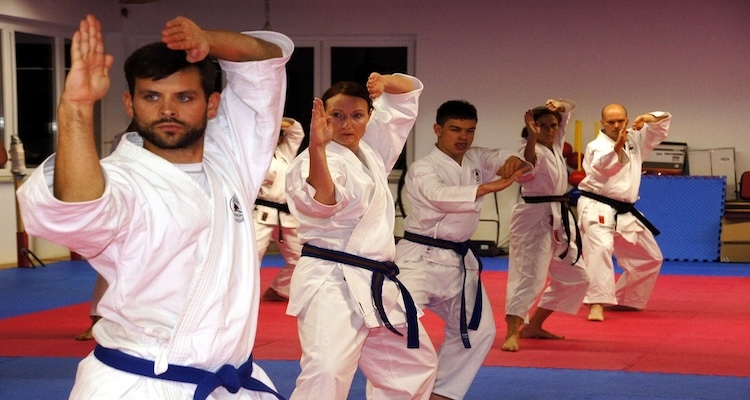
Karate, a traditional martial art originating from Okinawa, Japan, focuses on striking techniques using hands, elbows, feet, and knees. Practitioners, known as karatekas, train in katas (prearranged forms) and kumite (sparring) to develop self-defense skills, physical fitness, and mental discipline. Karate emphasizes techniques like punches, kicks, and blocks executed with precision, power, and fluidity. It promotes values such as respect, perseverance, and humility, making it both a physical and philosophical discipline revered worldwide for its effectiveness and depth.
Karate, like many martial arts, demands a balance of strength, agility, endurance, and mental focus. To meet these demands effectively, practitioners must pay careful attention to their nutritional intake. Proper nutrition not only fuels performance during training and competition but also supports recovery and overall health. Here's an exploration of the nutritional demands specific to the sport of karate:
Karate training involves intense physical activity, including strength training, cardiovascular conditioning, and technique practice. As such, practitioners require sufficient energy to fuel these activities. Carbohydrates are the body's primary energy source, providing fuel for muscles during high-intensity training sessions. Karatekas should include complex carbohydrates such as whole grains, fruits, and vegetables in their diets to sustain energy levels.
Karate training places significant stress on muscles, leading to micro-tears that require repair and rebuilding for strength and endurance gains. Adequate protein intake is essential to support muscle repair and growth. Sources of lean protein such as poultry, fish, eggs, tofu, and legumes should be incorporated into the diet to ensure proper recovery and muscle maintenance.
Proper hydration is crucial for maintaining performance and preventing fatigue during karate practice. Dehydration can impair physical and cognitive function, leading to decreased performance and increased risk of injury. Karatekas should drink water regularly throughout the day and consume fluids before, during, and after training sessions to stay adequately hydrated.
Essential vitamins and minerals play vital roles in various physiological processes, including energy metabolism, muscle contraction, and immune function. A balanced diet rich in fruits, vegetables, whole grains, nuts, and seeds provides essential micronutrients necessary for optimal health and performance. Additionally, certain micronutrients like calcium, magnesium, and vitamin D are crucial for bone health, which is particularly important for karatekas to prevent injuries.
Proper timing of meals and snacks is essential to fuel workouts effectively and support recovery. Consuming a balanced meal containing carbohydrates and protein about 2-3 hours before training provides adequate energy and nutrients for optimal performance. Additionally, consuming a post-workout meal or snack rich in carbohydrates and protein within 30-60 minutes after training helps replenish glycogen stores and support muscle recovery.
Depending on their specific goals and competitive requirements, karatekas may need to manage their weight effectively. This often involves balancing energy intake with expenditure to achieve and maintain an optimal weight for performance while ensuring adequate nutrition to support training demands.
In summary, the sport of karate places unique nutritional demands on practitioners, requiring a balance of macronutrients, hydration, micronutrients, and proper timing of meals and snacks. By prioritizing nutrition and adopting healthy eating habits, karatekas can optimize their performance, support recovery, and maintain overall health and well-being. One way to do that is to consult with a sports nutritionist or sports dietician We now turn to explore how that maybe useful.
Working with a sports nutritionist can be highly beneficial for karate competitors in several ways:
A sports nutritionist can assess an individual karateka's dietary needs based on factors such as age, gender, weight, training intensity, and competition schedule. They can develop personalized nutrition plans tailored to the athlete's specific goals, whether it's improving performance, managing weight, or enhancing recovery.
Nutrition plays a critical role in optimising athletic performance. A sports nutritionist can advise on the optimal timing and composition of meals and snacks to fuel workouts effectively, sustain energy levels during training sessions, and enhance endurance and strength during competitions. By ensuring the karateka's body has the right nutrients available at the right times, a nutritionist can help maximize performance potential.
Proper hydration is essential for maintaining performance and preventing fatigue, particularly during intense training sessions and competitions. A sports nutritionist can develop hydration strategies customized to the individual athlete's needs, considering factors such as sweat rate, environmental conditions, and training duration. This ensures that the karateka remains adequately hydrated to perform at their best.
Efficient recovery is crucial for karatekas to bounce back from intense training sessions and competitions, reduce the risk of injury, and prepare for future performances. A sports nutritionist can recommend post-workout nutrition strategies to replenish glycogen stores, repair muscle tissue, and promote recovery. This may include consuming a balanced meal or snack containing carbohydrates and protein shortly after training to kickstart the recovery process.
Some karate competitions have weight classes, requiring athletes to manage their weight effectively while maintaining strength and energy levels. A sports nutritionist can provide guidance on healthy weight management strategies, including proper nutrition, portion control, and hydration practices. They can help athletes achieve their weight goals safely and effectively, ensuring they compete at their optimal weight without compromising performance or health.
Beyond meal planning and hydration strategies, a sports nutritionist can educate karate competitors about the importance of nutrition for overall health and athletic performance. They can provide valuable information about macronutrients, micronutrients, supplementation, and dietary habits that support long-term success in the sport. Additionally, they can offer ongoing support, motivation, and accountability to help athletes stay on track with their nutrition goals.
Overall, working with a sports nutritionist can provide karate competitors with the knowledge, guidance, and support they need to optimise their nutrition, enhance performance, support recovery, and achieve their competitive goals.
You should always consult a qualified healthcare professional about any nutrition queries. You can find a sports nutritionist near you, or online, on our global directory of sport performance professionals. Just visit our home page and try our easy-to-use directory.
